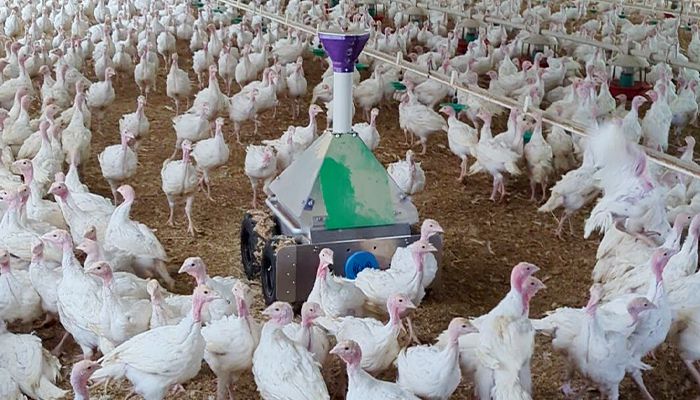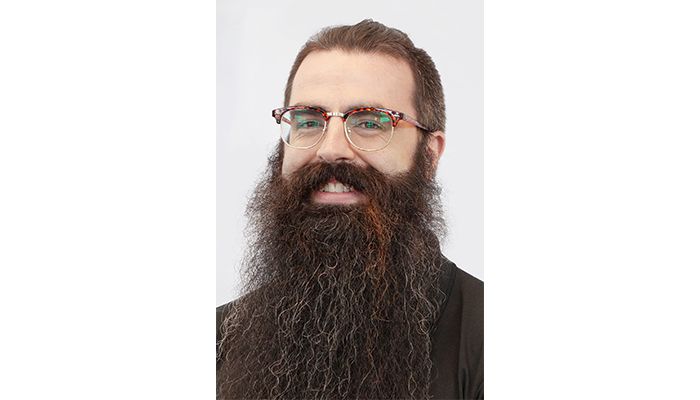A hub for innovation
Author
Published
12/2/2024
Two Iowa ag trailblazers place among top 10 in AFBF Ag Innovation Challenge as they move their game-changing inventions closer to commercialization.
Iowa’s reputation as an incubator for agricultural entrepreneurs was proven again this year as two companies are among the top 10 semifinalists in the American Farm Bureau Ag Innovation Challenge. Both companies — ReEnvision Ag and Poultry Patrol — are conducting research trials to refine their inventions as they push toward commercialization of their products.
ReEnvision Ag has been awarded a $50,000 digital and precision agriculture seed grant through Iowa State University’s (ISU) Office of the Vice President of Research, aimed at advancing the start-up’s cutting-edge SeedSpike planter row technology and supporting research to enhance crop emergence and yield.
The partnership will enable in-field research and analysis of the Iowa company’s revolutionary planting system, which uses a cone-shaped dibble to place seeds precisely at an exact depth and spacing.
The system offers a wider planting window, improves soil health, optimizes planting depth and spacing in diverse conditions, and minimizes soil contact and compaction compared to current technologies, according to Jayson Ryner, founder and CEO of ReEnvision Ag.
He said the collaboration with ISU will help accelerate the product toward commercialization, expected in early 2026.
“Getting that university feedback that farmers have been asking for is critical — proof and data that we have the five- to seven-day planting window advantage that we have seen,” said Ryner, a Floyd County Farm Bureau member. “We’ll be getting independent, third-party confirmation from emergence and uniformity all the way to yield.”
ReEnvision Ag will also conduct custom planting trials for farmers in north central Iowa, covering around 500 acres. Results from these trials, analyzed by ISU, are anticipated in the spring of 2026.
“The data will show how we compare to the traditional double-disc opener we aim to replace,” Ryner added.
Dream project
ReEnvision Ag is the culmination of a dream project Ryner initiated five years ago. The venture has evolved through continuous hard work, innovation and industry support. It has garnered widespread recognition, including a fourth-place finish in the John Pappajohn Start-Up of the Year, first place in the Iowa Innoventure Fund challenge, acceptance into the AgLaunch 365 ag accelerator cohort and being named a top 10 semifinalist in the American Farm Bureau Federation’s Ag Innovation Challenge in 2022-23 and 2024-25.
Ryner’s planter design effectively pokes a hole in the ground, inserts the seed and covers it. The key design innovation is its ability to plant in challenging conditions, such as thick, no-till environments or wet soils.
The process offers benefits in soil health, water quality, sustainability and carbon sequestration. Unlike conventional disc planters that disturb soil, Ryner’s design leaves the soil as undisturbed as possible.
“The double-disc opener has been great for the tillage era. We are designing a planter for the soil health era,” Ryner said.
Refining the prototype
Since its unveiling in 2020, ReEnvision Ag’s planter has gone through several prototype iterations, incorporating design updates and improvements based on extensive testing. Recent field trials in Tennessee, Nebraska and Kansas have led to significant advancements, Ryner said.
“We’ve really used farmer feedback to move the project forward,” he said, “focusing on reducing the moving parts, which improves reliability …, necessary before we can come to market with something,” Ryner said. “We conducted a trial in 2023 in Memphis …, and from there we learned a lot about farmers needing to be able to service it, and we needed an electric drive to match the ground speed. So we’ve been really concentrating on design elements that allow the farmer to be able to work on it in the field.”
In Nebraska, they worked across various soil types.
“Really looked at how the different types of soil can stick to the spikes and how to solve those issues,” Ryner said. “Then we went down to southern Kansas and did a trial poking through a thatch layer where they’d gone through and chopped the cover crop.
“We showed that you can poke through without disturbing it. So we’re just seeing what we can learn and putting the planter in different areas to see how it performs.”
Most importantly, Ryner emphasized that there have been no significant setbacks or “stop signs” during the development process. “We haven’t had to make any major pivots,” he said.
“The company is built by and for farmers with farmers providing the majority of the funding. We’re kicking off on a new fundraising round to bring the SeedSpike to market. The goal is to complete the ISU research grant and plant as many test plots for farmers as we can, then use that data to bring a limited release of 60 row units in 2026, whether that be five 12-row planters or 10 six-row planters or even a couple of 24-row planters.”
Key advancements include precise seed spacing with an adjustable setting allowing soybeans to be planted in 15-inch rows. The planter can handle various crops like corn, soybeans and cotton and operate at faster speeds.
“We now can plant north of six miles per hour,” Ryner said.
Engineers also are refining the seed delivery system using blower technology. “We’ve made great progress with our own seed meter in 2024,” he added.
Judges' feedback
ReEnvision Ag has gained valuable feedback from judges during the AFBF Innovation Challenge to further develop the product. Ryner expressed gratitude for the process and the networking opportunities it provided.
“Having been a semifinalist twice, the judges could see how we took the feedback they presented the first go-around and used that in our application and development,” Ryner said. “We took to heart their recommendations, their criticisms and really worked on them.
“We are really happy being selected into the semifinals again this year. The suggestions have been extremely beneficial. We’re excited about what the future holds.”
To learn more about ReEnvision Ag, contact Ryner at Jayson@ReEnvisionAg.com
Poultry patrol
Joining ReEnvision Ag as a semifinalist in this year’s AFBF Innovation Challenge is Poultry Patrol, a company developed in 2019 by Jack Kilian. He, with the assistance of advisor John Zimmerman, developed a robot designed primarily for commercial turkey barns, where it has shown promising results in improving daily gain and overall animal health.
The robot performs a range of tasks, including increasing bird movement, notifying growers of feed spills and water leaks, tilling barn bedding, and monitoring mortality rates. It patrols barns four times daily, providing detailed reports that include metrics and timelapse videos.
Poultry Patrol is currently collaborating with turkey growers on one-year trials to refine the technology and evaluate its impact.
Kilian first explored robotics for poultry farming while working on a goose-chasing robot at the Digi Labs tech incubator. His pivot to turkey barns began after winning Red Wing Ignite’s Ag Tech Challenge, which provided the funding and connections to launch Poultry Patrol.
“I ended up winning Red Wing Ignite’s Ag Tech Challenge that year, which gave me the funds to get a robot and connected me with our long-term advisor and longer-time turkey farmer John Zimmerman,” Kilian explained. “John welcomed us to his farm, shared all his insights about turkey and the industry, and really drove home how valuable a robot could be to him and other turkey farmers.”

Pictured above: The Poultry Patrol robot patrols a turkey barn. The robot keeps birds moving, which enhances bird health. PHOTO COURTESY OF POULTRY PATROL
Helps keep birds healthy
The robot has proven to enhance bird health and farm profitability by encouraging movement among turkeys.
“From what we observe, once we get some birds following the robot, more follow,” Kilian said. “So after a little driving, we’re essentially leading turkey parades around the barn. There’s a huge list of reasons why this helps keep the birds healthy.”
Increased movement reduces aggression, improves leg and bone development, and keeps turkeys eating and drinking. Kilian noted a significant reduction in mortality during the final 30 days of heavy tom grow-out, translating to financial gains.
“Converting this mortality reduction to dollars, it’s averaging more than two cents per pound for an average grower,” he noted.
Additionally, barns using the robot appear more resilient during disease outbreaks, maintaining weight gains while neighboring barns slow down.
Kilian credited the AFBF Innovation Challenge for helping to refine Poultry Patrol’s business strategy.
“It was extremely validating to have our company and idea picked as one of the best in the country,” said Kilian, a Johnson County Farm Bureau member.
Looking ahead, Poultry Patrol hopes to expand its testing into the chicken industry. Interested turkey or chicken farmers can reach Kilian at Jack@poultrypatrol.com or visit poultrypatrol.com for more information.

Pictured above: Kilian
Want more news on this topic? Farm Bureau members may subscribe for a free email news service, featuring the farm and rural topics that interest them most!